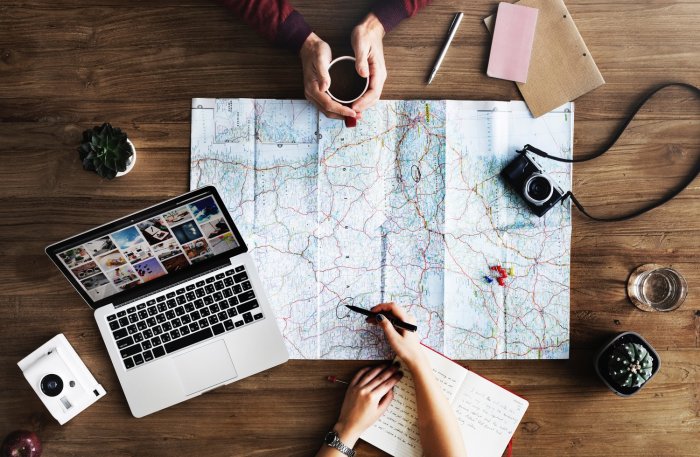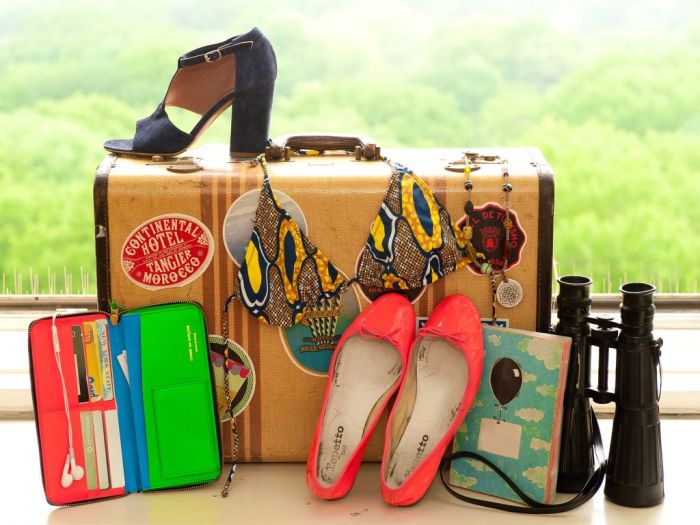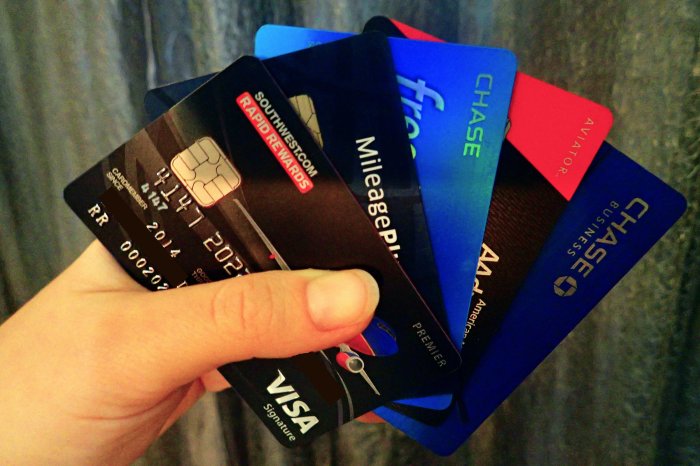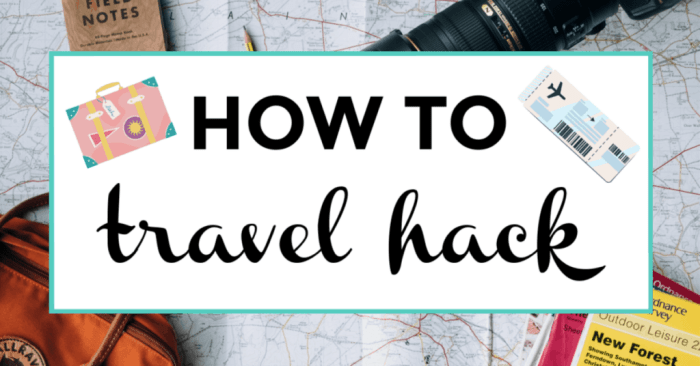Best way to go travelling sets the stage for this enthralling narrative, offering readers a glimpse into a comprehensive guide to maximizing travel experiences. From meticulous budgeting to choosing the perfect destination, this exploration delves into every facet of planning and executing unforgettable journeys.
This guide meticulously examines various travel styles, from solo adventures to family vacations, providing practical insights into selecting the ideal travel companions and destinations. It details the importance of pre-trip planning, including visa requirements, accommodation choices, and transportation options. Furthermore, the guide highlights the significance of safety precautions and post-trip reflection, ensuring readers not only plan their trips effectively but also maximize their enjoyment and learning.
Budgeting for Travel
Effective travel budgeting is crucial for a smooth and enjoyable experience. It allows for informed decisions about spending, prevents financial strain, and maximizes the value of your trip. A well-structured budget helps you allocate resources to experiences and activities that truly matter, leaving you with more freedom and less stress during your travels.
Different Budgeting Methods for Various Travel Styles
Travel styles dictate the approach to budgeting. Backpacking, for example, necessitates a highly focused, cost-conscious strategy, prioritizing affordable accommodations and meals. Luxury travel, on the other hand, demands a broader budget that accounts for high-end accommodations, premium dining, and exclusive experiences. Creating a personalized budget that reflects your chosen travel style ensures that you’re prepared for the financial demands of your trip.
Creating a Realistic Travel Budget
A realistic travel budget considers all potential expenses. This includes accommodation, food, activities, transportation, and unforeseen circumstances. It’s vital to research prices for these items in your destination, and factor in potential fluctuations. Detailed research is key to creating an accurate budget, ensuring you’re adequately prepared for your trip’s financial requirements.
Accommodation Cost Comparison (Example: Southeast Asia)
| Accommodation Type | Estimated Cost (per night) | Description |
|---|---|---|
| Hostel Dorm | $10-$30 | Shared rooms, basic amenities |
| Budget Hotel | $30-$80 | Private rooms, often with basic amenities |
| Airbnb (private room) | $40-$150 | Private room in a shared house, often with better amenities |
| Luxury Hotel | $150+ | High-end facilities and services |
The table above showcases a comparison of accommodation costs in Southeast Asia. The prices are estimates and may vary depending on the specific location and time of year. This comparison highlights the significant cost differences between various accommodation types, enabling informed decisions based on budget.
Travel Budget Examples for Different Destinations and Trip Durations
The cost of travel varies significantly based on destination and duration. A week-long trip to a budget-friendly destination like Southeast Asia will likely cost less than a luxury vacation in Europe for the same duration. It is essential to consider these factors to create an accurate and realistic budget. Thorough research is necessary to predict the expenses of different destinations and durations, and this should inform your budget planning.
Example: A 10-day backpacking trip through Thailand could cost approximately $800-$1200, while a 5-day luxury trip to the Maldives could cost upwards of $5000-$10000. These figures include accommodation, food, transportation, and some activities.
Choosing a Destination
Selecting the perfect travel destination is a crucial step in planning a memorable trip. Careful consideration of personal preferences, financial resources, and available time is paramount. This process often involves balancing the desire for an exciting adventure with the need for a relaxing retreat, or the historical allure of a long-forgotten era. The ideal destination hinges on a nuanced understanding of one’s needs and desires.A well-researched destination provides a framework for a positive travel experience.
Understanding the local culture, customs, and safety protocols is essential for a smooth and enriching journey. Considering potential risks and adapting travel plans accordingly can mitigate potential issues. Ultimately, the choice between a bustling metropolis and a tranquil countryside depends on the traveler’s unique preferences.
Factors to Consider When Choosing a Destination
Careful planning is vital for a successful trip. The destination should align with personal interests and budget constraints. Time limitations also play a critical role in the decision-making process. A thorough evaluation of these factors ensures a fulfilling travel experience.
- Interests: Passion for adventure, relaxation, or historical exploration should guide the destination selection. A nature enthusiast might opt for a national park, while a history buff might choose a city steeped in historical significance. Interests should be the driving force behind the selection process.
- Budget: Travel destinations vary significantly in cost. Accommodation, transportation, food, and activities all contribute to the overall budget. A realistic budget helps narrow down the possibilities and avoid financial strain.
- Time Constraints: The duration of the trip dictates the feasible destinations. A short weekend getaway might limit choices to nearby locations, while a lengthy vacation offers more options for exploring further afield.
Importance of Destination Research
Thorough research is crucial for a safe and enjoyable trip. Understanding the destination’s culture, customs, and safety measures is essential. Local laws and customs should be respected, ensuring a respectful and culturally sensitive trip. Understanding safety precautions can prevent potential risks.
- Culture: Learning about local customs and traditions fosters respect and appreciation. Researching cultural norms and expectations helps travelers avoid misunderstandings and cultural faux pas.
- Customs: Understanding local customs and regulations is essential for smooth travel. This includes local laws and regulations concerning attire, behavior, and interactions.
- Safety: Gathering information about safety precautions and potential risks is crucial. Knowing the local crime rate, prevalent scams, and necessary safety protocols helps travelers prepare and mitigate potential issues.
Popular vs. Less-Visited Destinations
Both popular and less-visited destinations offer unique experiences. Popular destinations often boast established infrastructure and readily available services. However, they can be more crowded and expensive. Conversely, less-visited destinations often provide a more authentic cultural immersion and a more tranquil experience. A balanced perspective on both types of destinations allows for a wider range of choices.
| Category | Popular Destination Example | Less-Visited Destination Example | Description |
|---|---|---|---|
| Adventure | Nepal | Kyrgyzstan | Nepal offers renowned trekking trails, while Kyrgyzstan provides unique mountain experiences. |
| Relaxation | Bali | Costa Rica | Bali’s beaches and spas are well-known, while Costa Rica offers diverse eco-tourism opportunities. |
| History | Rome | Kyoto | Rome is rich in ancient history, while Kyoto showcases centuries of Japanese culture. |
Travel Planning & Preparation
Effective travel planning is crucial for a smooth and enjoyable experience. It involves meticulous preparation, from securing essential documents to anticipating potential challenges. This proactive approach minimizes stress and maximizes the value of your journey. Proper planning allows travelers to focus on experiencing their destination rather than battling logistical hurdles.
Booking Flights and Accommodation
Strategic booking is paramount to maximizing value and minimizing cost. Flights and accommodation should be booked in advance, especially for popular destinations during peak seasons. Consider using flight comparison websites and accommodation aggregators to find the best deals. Flexible dates and times can often yield significant savings. Also, explore alternative accommodation options beyond traditional hotels, such as hostels or Airbnb, which can offer unique experiences and budget-friendly options.
Reviewing reviews and ratings can provide valuable insight and avoid potentially problematic situations.
Obtaining Necessary Visas
Visa requirements vary significantly by destination. Research visa requirements well in advance to avoid delays or rejection. Gather all necessary documents and apply well ahead of your travel dates to allow for potential processing time. Consult with a travel agent or embassy website for specific details regarding your nationality and the destination country. Thorough research prevents costly and time-consuming setbacks.
Preparing for Travel Scenarios
Thorough preparation for various travel scenarios enhances the overall travel experience. Acclimatizing to potential weather changes and having a plan for emergencies are vital aspects of this preparation. Understanding local customs and emergency procedures provides a safety net. Maintaining a well-organized itinerary and keeping important documents in a secure location are also essential steps.
Packing Efficiently
Packing effectively is critical for a comfortable and stress-free journey. The appropriate packing strategy depends on the duration and type of trip. Consider the climate, activities, and expected social situations. Create a packing list in advance and pack only essential items. Using packing cubes and compression bags can optimize space and reduce the risk of damaged clothing.
Packing Strategies for Different Trip Durations
For short trips (e.g., a weekend getaway), pack light, focusing on versatile clothing items that can be mixed and matched. Pack layers to adapt to changing weather conditions. For longer trips (e.g., a month-long backpacking tour), pack versatile clothing items, and consider buying or renting items at your destination to reduce the weight of your luggage.
Packing Strategies for Different Destinations
Different destinations demand different packing strategies. For tropical climates, pack lightweight, breathable clothing. For colder climates, pack warm layers, waterproof jackets, and comfortable footwear. For cultural destinations, research local customs and dress accordingly. Respect local traditions by adapting your attire.
A diverse understanding of the local environment and culture can significantly improve your travel experience.
Emergency Preparedness
Travelers should always prepare for emergencies. Maintain contact information of emergency contacts and embassy officials. Purchase travel insurance to cover medical emergencies, lost luggage, or trip cancellations. Familiarize yourself with local emergency numbers and procedures. A comprehensive emergency preparedness plan is essential for any traveler.
Travel Styles & Preferences

Source: timeofinfo.com
Maximizing travel experiences often hinges on planning. A great way to immerse yourself in nature and discover hidden gems is by exploring good hiking trails near me. Finding those ideal trails, like the ones listed in this guide, good hiking trails near me , can significantly enhance any trip. This approach to travel, focused on exploration and discovery, leads to truly memorable journeys.
Choosing a travel style is a crucial step in planning a successful and enjoyable trip. Understanding your personal preferences and the nuances of various travel styles will optimize your experience. This involves considering factors like your desired level of independence, the company you’ll be traveling with, and your tolerance for spontaneity. A well-defined travel style informs crucial decisions throughout the planning process, from budgeting and destination selection to packing and on-the-ground activities.Travel styles encompass a wide spectrum, from the independent wanderlust of solo travel to the shared experiences of group trips and the family-centric approach.
Each style presents unique challenges and rewards, and careful consideration of these factors will lead to a more fulfilling and less stressful travel experience. Understanding the specific needs of your chosen style, including the necessary flexibility and adaptability to unexpected events, is vital for a positive outcome.
Solo Travel
Solo travel offers unparalleled freedom and independence. It allows travelers to set their own pace, explore destinations at their own rhythm, and make spontaneous decisions without the need to compromise with others. This style often fosters personal growth and self-reliance, encouraging travelers to step outside their comfort zones and develop a deeper understanding of themselves. However, it can also present feelings of isolation, especially for those not accustomed to being alone for extended periods.
This style requires a high degree of self-sufficiency, including the ability to navigate unfamiliar environments and handle potential emergencies independently.
Group Travel
Group travel, encompassing friends, family, or organized tours, often provides a supportive and social environment. Sharing experiences and creating memories with loved ones can enrich the trip significantly. However, it necessitates compromises and a degree of flexibility to accommodate the preferences of others. The advantages of group travel include shared costs, built-in social interaction, and support systems.
However, the pace and decisions might be dictated by the group, potentially hindering the ability to pursue individual interests.
Family Travel
Family travel offers a unique opportunity to create lasting memories and bond as a unit. It involves careful planning to accommodate the needs and interests of all family members, particularly children. The experience can be enriched by interactive activities and experiences tailored to their ages and preferences. However, family travel requires a high level of patience, understanding, and flexibility to navigate potential conflicts and disagreements.
The challenges are often outweighed by the shared joy and the opportunity to create unforgettable family moments.
Travel Companions and Flexibility
Choosing travel companions is an important aspect of the experience. A good travel companion can enhance the journey, while a less compatible one can create friction. Understanding the strengths and weaknesses of potential companions and their travel styles is crucial. Different personalities and preferences can complement each other or create challenges, requiring compromise and adaptability.
Adaptability and Flexibility, Best way to go travelling
Flexibility is paramount in travel. Unexpected events, from flight delays to unforeseen circumstances, are common. Travelers must be prepared to adjust their plans, embrace the unexpected, and remain adaptable. Adaptability allows for a more enriching experience, as it opens doors to serendipitous discoveries and unforeseen adventures.
Transportation Options
Navigating the globe effectively hinges on choosing the right transportation mode. From the sprawling expanse of land routes to the swift connections of air travel, each method presents a unique set of advantages and disadvantages. Careful consideration of these factors is crucial for optimizing travel experiences and maximizing value.
Factors Influencing Transportation Choice
Selecting the ideal transportation mode involves a multifaceted approach. Budget constraints, travel duration, destination characteristics, and personal preferences play significant roles. A thorough assessment of these factors allows for informed decisions that align with individual needs and goals.
Evaluating Flight Options
Air travel offers unparalleled speed and convenience for long-distance journeys. The rapid transit enables travellers to cover vast distances in a relatively short time. However, flight costs can fluctuate considerably, making them a less cost-effective option for shorter trips. Consideration should also be given to factors such as airport transfer times, baggage allowance, and potential delays.
Analyzing Train Travel
Train travel provides a unique blend of comfort and scenic experiences. Long-distance rail journeys can offer an immersive cultural immersion. Trains are often more affordable than flights for medium-range trips, especially when factoring in accommodation costs. However, train schedules can be inflexible and travel times can be significantly longer than air travel.
Assessing Bus Travel
Buses offer a budget-friendly alternative for short-to-medium distance travel. The accessibility of bus networks makes them an attractive option for travellers seeking economical options. However, bus travel often compromises on speed and comfort, particularly on long-distance journeys.
Considering Car Travel
Road trips allow for unparalleled flexibility and self-sufficiency. The ability to stop at any desired location makes it ideal for those seeking an immersive experience. However, car travel can be costly, especially when accounting for fuel, tolls, and potential parking fees. Furthermore, driving can be time-consuming, especially in congested areas or across long distances.
Table: Estimated Transportation Costs
This table provides an example of estimated costs for various transportation options between two cities (e.g., New York City and Los Angeles). It is essential to note that these are estimated costs and actual prices may vary.
| Transportation Mode | Estimated Cost (USD) | Pros | Cons |
|---|---|---|---|
| Flights (round trip) | $500 – $1000 | Speed, convenience | Higher cost, potential delays |
| Train (round trip) | $200 – $500 | Comfort, scenic views, often more affordable | Longer travel times |
| Bus (round trip) | $100 – $300 | Budget-friendly, accessible | Longer travel times, less comfort |
| Car (round trip) | $200 – $500 (including fuel and tolls) | Flexibility, self-sufficiency | Time-consuming, higher costs for fuel and potential parking |
Accommodation Options
Choosing the right accommodation is crucial for a smooth and enjoyable travel experience. It directly impacts your budget, comfort, and overall travel satisfaction. From budget-friendly hostels to luxurious hotels, the range of options caters to diverse needs and preferences. Understanding the nuances of each type allows travelers to make informed decisions that align with their individual travel styles.Accommodation options vary significantly, influencing both the financial aspect and the experience itself.
A meticulous evaluation of each option based on individual needs and preferences is key to optimizing the travel experience. This often involves balancing cost, desired amenities, and the location’s proximity to attractions.
Types of Accommodation
Different accommodation types offer varying levels of comfort, amenities, and price points. Understanding these distinctions is essential for selecting the best option for your trip. The available choices range from budget-friendly hostels to opulent hotels, each with its own set of advantages and disadvantages.
- Hotels: Hotels provide a range of amenities, including comfortable rooms, dining options, and often access to pools, spas, and fitness centers. They are a popular choice for travelers seeking convenience and a wide array of services.
- Hostels: Hostels are a budget-friendly alternative, particularly for solo travelers or groups. They typically offer dorm rooms with shared facilities. This option is well-suited for social travelers looking to meet people.
- Airbnb: Airbnb offers a wide variety of accommodations, from private rooms to entire apartments, often in unique and locally-inspired settings. It provides a more personalized experience compared to traditional hotels.
- Camping: Camping is a cost-effective and adventurous option for nature lovers. It typically involves setting up tents in designated campsites, providing a direct connection with the environment.
Pros and Cons of Each Accommodation Type
Evaluating the advantages and disadvantages of each type is crucial for selecting the most suitable accommodation. The ideal choice depends on the traveler’s specific requirements and preferences.
| Accommodation Type | Pros | Cons |
|---|---|---|
| Hotels | Wide range of amenities, convenient location, high level of service, often include meals and other facilities. | Generally more expensive, can be impersonal, limited personalization, potential for noise. |
| Hostels | Budget-friendly, excellent for social interaction, often located in central areas, conducive to meeting fellow travelers. | Dorm rooms can be crowded, shared facilities may not be as private, limited amenities. |
| Airbnb | Unique and personalized experiences, often more affordable than hotels in specific locations, potential for local interaction, flexibility in space. | Varying levels of cleanliness and service quality, potentially less convenient location, lack of 24/7 staff. |
| Camping | Cost-effective, immersive nature experience, freedom and flexibility, great for outdoor enthusiasts. | Can be inconvenient for those seeking comfort, reliance on self-sufficiency, potential for inclement weather. |
Selecting the Best Accommodation
Factors such as budget, desired amenities, and location play a significant role in selecting the optimal accommodation. Consider your individual travel style and preferences to make the most informed choice. Personalizing the accommodation selection to match your travel style can greatly enhance the overall experience.
Experiences & Activities
Crafting unforgettable travel experiences goes beyond simply ticking off tourist attractions. It’s about immersing yourself in the local culture, engaging with the community, and creating memories that resonate long after your trip concludes. This process requires careful planning, a flexible approach, and an open mind.Planning for meaningful experiences involves recognizing that travel is more than just sightseeing; it’s about interaction and immersion.
Understanding the nuances of the destination’s culture and history enhances the overall experience, while respecting local customs ensures a positive interaction with the community.
Planning Exciting and Memorable Experiences
Travel experiences are profoundly shaped by careful planning. Thorough research into local customs and traditions helps travelers to navigate cultural nuances with sensitivity and respect. Incorporating activities beyond typical tourist traps allows for a deeper understanding of the destination’s essence. Anticipating potential challenges, such as language barriers or unfamiliar customs, and proactively seeking solutions can enhance the trip’s enjoyment.
Examples of Activities for Different Interests and Budgets
A diverse range of activities cater to various interests and budgets. For the adventurous traveler, hiking, kayaking, or rock climbing offer thrilling experiences. Foodies can embark on culinary tours to explore local cuisines, while history buffs can delve into historical sites and museums. Budget-conscious travelers can discover hidden gems like local markets, parks, or community events. Consider a walking tour of a city, visiting a local market for souvenirs and food, or taking a cooking class to experience a region’s culinary traditions.
These experiences provide valuable insight into the destination’s unique characteristics.
Importance of Cultural Sensitivity
Respecting local customs and traditions is crucial for a positive travel experience. This involves understanding local etiquette, dress codes, and religious practices. Learning a few basic phrases in the local language demonstrates respect and facilitates communication. Cultural sensitivity also means avoiding behaviors that might be considered offensive or disrespectful. For example, in some cultures, it’s inappropriate to photograph people without their permission.
Showing respect and curiosity demonstrates genuine interest in the local culture and fosters positive interactions. Respectful behavior not only enriches your travel experience but also contributes to a positive image of your home country.
Incorporating Local Experiences into Travel Plans
Integrating local experiences into your itinerary is vital for a more authentic and meaningful journey. This could involve visiting local markets, attending community events, or taking a cooking class to learn about local cuisine. Engage with local guides or community members to gain firsthand insights and discover hidden gems. Incorporating these elements into your itinerary allows for a richer understanding of the destination beyond the typical tourist attractions.
Visiting local markets or attending local festivals provides opportunities to interact with the community, gain insights into their lives, and purchase unique souvenirs. These interactions offer a unique perspective and foster a stronger connection with the destination.
Staying Safe During Travel

Source: allaboutgoodlife.com
Global travel has become increasingly popular, presenting exciting opportunities but also demanding heightened awareness of safety measures. Understanding potential risks and implementing proactive strategies are crucial for a positive and secure travel experience. Thorough preparation, coupled with a vigilant approach, can mitigate dangers and allow travelers to fully enjoy their journeys.Travel safety encompasses a wide range of precautions, from understanding local customs and regulations to managing potential emergencies.
Maximizing travel enjoyment often hinges on meticulous planning. One key aspect is discovering local gems, like the fantastic hiking trails near you. Exploring nice hiking trails near me provides a refreshing change of pace and a unique perspective, enriching the overall travel experience. Ultimately, the best way to travel involves a blend of structured planning and spontaneous exploration.
A proactive approach, incorporating research, planning, and awareness, is essential to ensure a safe and enjoyable trip. Different destinations present varying levels of risk, demanding tailored safety measures. Adaptability and a willingness to adjust travel plans based on evolving circumstances are key components of responsible and safe travel.
Safety Precautions for Different Destinations
Understanding the unique risks associated with specific destinations is paramount. Researching local laws, customs, and potential safety hazards is crucial. For example, regions with political instability or heightened crime rates necessitate a more cautious approach, including avoiding certain areas at night and being aware of personal belongings. Similarly, destinations with extreme weather conditions require adjustments to clothing, gear, and travel plans to prevent injury or illness.
Handling Potential Emergencies During Travel
Having a well-defined emergency plan is essential. This includes identifying local emergency numbers, knowing how to access medical assistance, and understanding the procedures for reporting lost or stolen items. Creating a travel itinerary that incorporates contingency plans and potential delays can help manage unforeseen events.
For a truly enriching travel experience, prioritizing outdoor activities can elevate the overall journey. Discovering scenic trails for hiking near you, like those detailed in this comprehensive guide trails for hiking near me , provides a unique perspective and fosters a deeper connection with nature. Ultimately, this type of immersive exploration is a key component of the best way to go travelling.
Essential Safety Documents and Travel Insurance
Valid passports, visas (if required), and important contact information should be kept readily accessible and in multiple secure locations. This includes a physical copy and a digital backup stored on a separate device. Travel insurance is highly recommended to cover unexpected medical expenses, trip cancellations, or lost luggage. Insurance policies should be reviewed thoroughly to understand coverage limitations and exclusions.
Safety Tips for Solo Travelers
Solo travelers require specific safety considerations. Avoiding traveling alone in isolated areas, particularly at night, is crucial. Staying connected with friends or family by sharing itinerary details and checking in regularly is important. Inform others about your travel plans and keep your phone charged and readily available. Utilizing ride-sharing services or taxis, rather than public transport in unfamiliar areas, can be a more secure option.
Optimizing your travel experience hinges on careful planning. Consider factors like budget, desired destinations, and the time of year, and then researching Travel options to find the best fit. Ultimately, the best way to go traveling is to thoroughly investigate your choices before booking.
Post-Trip Reflection: Best Way To Go Travelling

Source: topdreamer.com
Reliving travel experiences enriches the journey itself, transforming fleeting moments into lasting memories. This post-trip reflection phase is crucial for understanding and appreciating the journey’s impact. It’s a time to consolidate learnings and refine future travel strategies. Thorough documentation and mindful reflection not only preserve cherished memories but also foster personal growth.
Documenting Travel Experiences
Capturing memories is a key aspect of post-trip reflection. Effective documentation preserves the essence of the journey, transforming fleeting impressions into tangible reminders. This involves a multi-faceted approach, incorporating various media for a comprehensive record.
- Photographs and Videos: High-quality photographs and videos are vital. Document not only iconic landmarks but also everyday moments, capturing the local culture, the interactions, and the unique atmosphere of the destination. Employing different angles and perspectives enhances the visual narrative.
- Travel Journals: A physical travel journal provides a personal touch. Write about the sights, sounds, smells, and emotions experienced during the trip. Detailed descriptions of encounters with locals and the local cuisine are essential. Incorporating sketches or doodles adds a unique dimension to the narrative.
Creating a Travel Journal
A travel journal is more than just a notebook; it’s a personal time capsule. It becomes a valuable tool for recalling and reliving experiences. A well-structured journal fosters deeper connections with the journey.
- Design and Structure: The design should be personalized, reflecting the traveler’s style. A consistent format helps maintain continuity, and dividing the journal into sections (e.g., daily logs, destination overviews, and reflection pages) is recommended. A dedicated section for sketches or maps is beneficial.
- Detailed Entries: Each entry should be detailed, describing the location, activities, and interactions with the local culture. Include sensory details—the taste of food, the sounds of the environment, and the feel of the atmosphere. Adding personal reflections and insights enhances the narrative’s depth.
Sharing Travel Experiences
Sharing travel experiences is a vital part of the post-trip reflection process. It allows others to benefit from your insights and creates a shared narrative. Platforms for sharing can be diverse, fostering a sense of community and connection.
- Social Media: Social media platforms offer a straightforward way to share travel highlights. High-quality images and videos with descriptive captions allow others to vicariously experience the trip.
- Travel Blogs and Websites: A travel blog or website provides a more in-depth account of the journey. It can include detailed itineraries, recommendations, and personal insights, potentially becoming a resource for future travelers.
- Conversations with Others: Sharing stories with friends and family provides an opportunity for deeper connections and fosters memorable experiences. Discussions about the journey’s highlights and lowlights create a shared narrative and a platform for personal growth.
Reflecting on Travel Experiences
Reflection on travel experiences offers invaluable learning opportunities. This process allows individuals to analyze their behavior and perspectives. These insights contribute to personal growth and development.
- Identifying Lessons Learned: Reflecting on the trip helps identify personal strengths and areas for improvement. Understanding how reactions to challenges or unexpected events can foster personal development.
- Developing Empathy and Understanding: Experiencing different cultures and perspectives fosters empathy and understanding. Travel allows for a broader view of the world and its diverse populations.
- Expanding Perspectives: Travel experiences broaden perspectives, leading to a deeper understanding of the world. These insights can influence future decisions and lead to a more informed and compassionate worldview.
Closing Summary
In conclusion, this comprehensive guide provides a roadmap for creating extraordinary travel experiences. By meticulously considering budgeting, destination selection, travel planning, and safety measures, individuals can maximize their enjoyment and create lasting memories. Remember to embrace flexibility, adapt to unexpected situations, and savor the journey.
FAQ Section
What’s the best way to compare accommodation costs across different regions?
Use online travel agents, comparison websites, and local reviews to gain a holistic view of pricing and amenities. Don’t just look at the headline cost; consider factors like location, amenities, and reviews.
How can I ensure my travel plans are flexible and adaptable?
Build in buffer time between activities, be open to changing plans based on unexpected opportunities, and have a backup plan for potential disruptions.
What are some key considerations for solo travelers regarding safety?
Inform someone of your itinerary, use reliable transportation, be aware of your surroundings, and consider travel insurance that covers emergency medical situations.
What’s the importance of researching a destination’s culture before travelling?
Understanding local customs and etiquette can foster respect and create a more enriching experience. Researching local customs prevents unintentional cultural faux pas and fosters a deeper appreciation for the destination.


